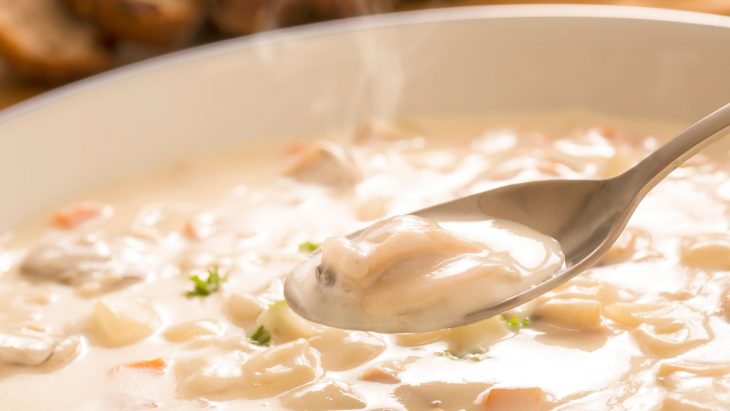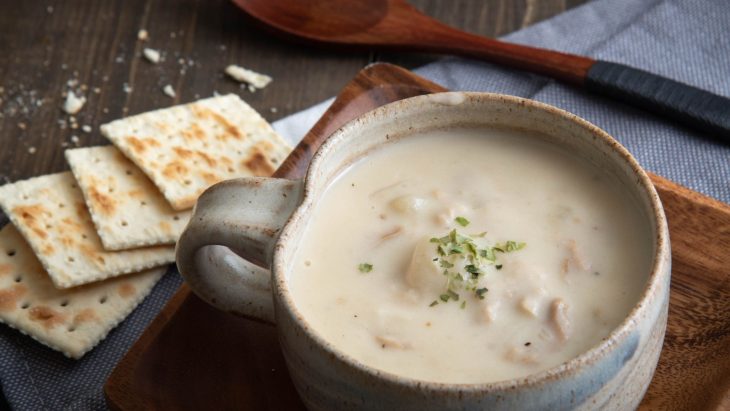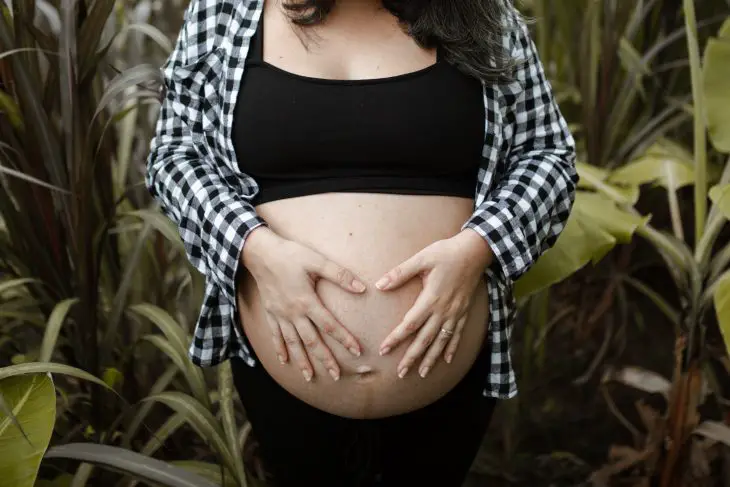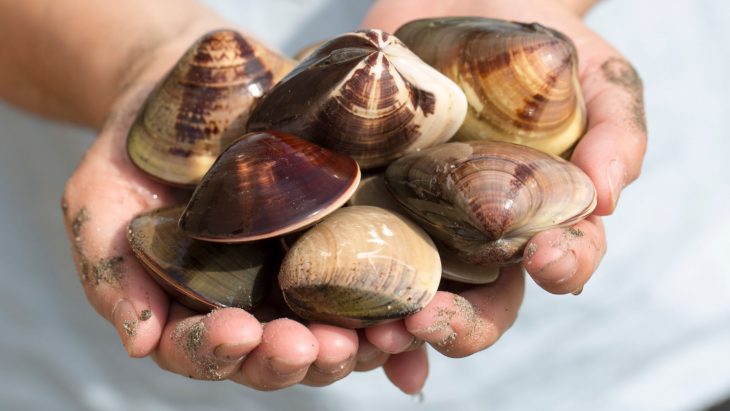Can you eat clam chowder while pregnant? The answer may surprise you! There are many foods that women who are pregnant ought to stay away from, and seafood often tops the list. Thankfully, however, not all seafood is considered bad for pregnant women to consume. But what about clams? Are they safe? Join us as we answer that question and more in today’s post.
Can Pregnant Ladies Eat Clam Chowder?
So, can pregnant ladies eat clam chowder? The answer is yes…in most cases.
Assuming that your clam chowder doesn’t contain any other harmful ingredients for pregnant women, you should be safe consuming clam chowder, even on a regular basis.
Related Read: Can Cinnamon Cause a Miscarriage
The reason that many doctors caution against the consumption of certain seafood is because of the mercury content. Mercury is an ocean sediment that is absorbed by fish as they swim. It is then converted to methylmercury, which is a liquid and very toxic form of mercury that can be harmful to humans.
When consumed in large quantities, methylmercury, otherwise known as “quicksilver”, can do a lot of harm to your health and the health of your unborn baby. For this reason, doctors recommend pregnant women stay away from seafood that is high in mercury.
The consequences that consuming foods high in mercury could have on you and your baby include:
- Damage to Lungs
- Damage to Brain
- Damage to Spinal Cord
- Damage to Nerves
- Damage to Kidneys
- Vision Problems
- Hearing Problems
- Anxiety
- Difficulty Breathing
- Tremors
- Difficulty Sleeping

Can You Eat Seafood Chowder When Pregnant?
Apart from clam chowder, seafood chowder can contain a hodgepodge of foods and ingredients that may or may not be harmful to health.
Some seafood chowder contains a variety of seafood meats like shrimp, scallops, and sea bass, and therefore, it is very important that you understand what ingredients make up your seafood chowder before eating it.
Most importantly, depending on the ingredients within your seafood chowder, you will want to avoid consuming the chowder too frequently. The ingestion of a lot of mercury over time may have devastating impacts on you and your fetus.
The following types of fish are often high in mercury and thus should be avoided when listed among ingredients in seafood chowder:
- Chilean Sea Bass
- Swordfish
- Shark
- King Mackerel
- Tilefish
- Bigeye Tuna
- Orange Roughy
- Marlin

Can You Eat Canned Clams When Pregnant?
Eating canned clams when pregnant likely poses little risk to you and your unborn baby. Although you’ll want to avoid consuming excessively large amounts of clams as the amount of mercury consumed may affect you over time.
Still, it is highly unlikely that you’ll consume enough mercury from eating clams to make you and your fetus sick as they only contain less than 0.01 ppm of mercury per 3-ounce serving.
Know also that despite the fact that certain clams may come in a can, you can rest assured that these canned clams are also low in mercury making them still quite safe to eat for pregnant women.
Can I Eat Clam Chowder While Breastfeeding?
Eating clam chowder is likely okay while breastfeeding.
When pregnant or breastfeeding, limit your intake of low mercury seafood to about 2-3 times per week. Remember that when breastfeeding, though the baby is no longer in your body, he or she can still feel the effects of you eating high mercury foods as this mercury is passed along through your breast milk.
Another separate concern when dealing with the consumption of clams and other types of shellfish while breastfeeding is the potential for allergies. Though breastfeeding while eating shellfish shouldn’t pose any problems for your baby (and in fact can be beneficial for exposing them to proteins needed to lower the chances of your baby becoming allergic to shellfish in the future) you should watch for any negative reactions your child may have. Report any concerns you have (such as rash, excessive gas, or fussiness following feedings) to your pediatrician as soon as possible.
Craving Clam Chowder During Pregnancy
If you find yourself craving clam chowder during pregnancy, feel free to enjoy a bowl or two of it. Just bear in mind that the general recommendation is to consume no more than 2-3 servings of low mercury seafood per week when pregnant to lower the risks of consuming too much mercury and it having a negative effect on you and your fetus.
Remember that although eating clams while pregnant is safe in moderate amounts, eating clam chowder that contains other ingredients that are considered unsafe for pregnant women will pose risks to your health.
When necessary, be sure to inquire about the ingredients included in your clam chowder to avoid mistakenly eating a chowder that could put your pregnancy at risk. This is especially true when your chowder may contain additional fish ingredients (as does seafood chowder) such as sea bass and other high-mercury fish types.

Can You Eat Cooked Clams While Pregnant?
Yes, you can eat cooked clams while pregnant. In fact, if you consume clams at all during pregnancy, they should always be cooked.
The reason you want to consume cooked clams instead of raw clams is that raw clams, and raw shellfish of any sort, pose risks of acquiring listeria or vibriosis. Eating raw oysters also poses this risk.
In case you are unaware, listeria is a foodborne illness that is very dangerous and can be life-threatening. Anyone can contract listeria, however, it is particularly threatening to those 65 and older and women who are pregnant. In fact, statistics show that pregnant women are ten times more likely to contract listeria than the average person.
Once a person has listeria, he or she is likely to vomit and have diarrhea. These symptoms can lead to dehydration which in turn can lead to stillbirth, miscarriage, preterm labor, and nutritional deficiencies, all of which could negatively impact your baby.

Other symptoms of listeria include:
- Headache
- Confusion
- Stiff Neck
- Loss of Balance
As illustrated, eating raw clams while pregnant, though low in mercury, still poses a risk to your health as concerns with listeria remain an issue. Therefore, it is always advised that you cook clams before consuming them whilst pregnant or breastfeeding.
Can You Eat Clam Chowder While Pregnant? Most Times, Yes!
In most scenarios, it is fine if a pregnant woman consumes clam chowder. The general recommendation, however, is that pregnant women consume no more than 2-3 servings of low mercury seafood per week. Any clams consumed should be eaten cooked rather than raw.
When consuming clam chowder, be sure you know the ingredients. Some chowders such as seafood chowder can include a variety of various kinds of seafood, and not all seafood is considered safe for pregnant and breastfeeding mothers.
As with everything moderation and quality, ingredients are the key, so you can eat raw clams, clam juice, any type of clam chowders, fried clams, stuffed clams, steamed clams, and even raw fish in sushi – as long as you are careful of the things we mentioned above.
Whether at a restaurant or a friend’s house, knowing the full list of ingredients in your clam or seafood chowder can ensure that you are chowing down safely for the health of both you and your baby.
Until next time!
More on pregnancy and food:
- Mother Milk Tea Side Effects
- Can I Drink Hot Chocolate While Pregnant
- Coconut Water When Breastfeeding
FAQ
Despite many warnings against the consumption of seafood for pregnant women, there are choices out there that are indeed healthy, and even recommended, for pregnant women.
Awesome seafood choices include salmon, pacific mackerel, anchovies, freshwater trout, sardines, and herring. In addition, pregnant and breastfeeding women may also freely consume shrimp, tilapia, cod, canned light tuna, and pollock.
Some studies have shown that eating fish during pregnancy and while breastfeeding could protect children against seafood allergies later in life. Still, you will want to be sure to exercise caution about the type of seafood you eat, and to eat it only in moderation when applicable.

Leave a Reply